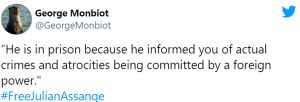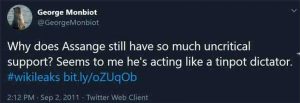In a September 24 piece in CounterPunch, one of my three September reads, Jonathan Cook wrote this of the nature of the temporary alliance between the Guardian and Wikileaks:
On the one hand, Assange needed the manpower and expertise provided by big-hitting newspapers like the New York Times, the Guardian and Der Spiegel to help Wikileaks sift through vast trove to find important, hidden disclosures. He also needed the mass audiences those papers could secure for the revelations, as well as those outlets’ ability to set the news agenda in other media.
Liberal media, on the other hand, needed to court Assange and Wikileaks to avoid being left behind in the media war for big, Pulitzer Prize-winning stories, for audience share and for revenues. Each worried that, were it not to do a deal with Wikileaks, a rival would publish those world-shattering exclusives instead and erode its market share.
For a brief while, this mutual dependency just about worked. But only for a short time. In truth, the liberal corporate media is far from committed to a model of unmediated, whole-truth journalism. The Wikileaks model undermined the corporate media’s relationship to the power establishment and threatened its access. It introduced a tension and division between the functions of the political elite and the media elite.
*
Three days ago, on October 8, Thomas Scripps wrote this in a WSWS piece:
Assange was subjected to a filthy show trial. Sham legal arguments aside, what took place at London’s Old Bailey was a process of vicious retribution against a journalist who exposed the barbarism of the ruling class before the world.
While Assange sat in the dock charged with “espionage”, the crimes he exposed were recounted by defence witnesses … “collateral murder” (the wilful killing of unarmed and injured civilians); “extraordinary rendition” (the illegal seizure of untried persons and their disappearance into “CIA black sites”); “enhanced interrogation” (with torture delivered against “hooded and chained” subjects, via beatings, “sodomy”, “controlled drowning” and the use of “coffin boxes”); and “wars of aggression”—the crime for which the Nazi leaders were indicted at Nuremburg—leading to the sociocide of Afghanistan and Iraq and the deaths of up to one million people.
*
On October 9 another piece by Jonathan Cook appeared in CounterPunch, George Monbiot’s excuses for not speaking out on Assange. Its focus is “that filthy show trial” at the Old Bailey, and again Cook dissects with calm objectivity the nature of the Guardian. This time it is with specific reference to a man held in high regard – awe even – by its more radical readers.
Monbiot is not the free thinker, the fearless investigator of difficult truths, the leftwing conscience he claims to be. It is not really his fault. It is in the nature of the function he serves at the Guardian – and with which I am only too familiar myself from my years working there.
The Guardian is the main outlet of Guardian Media Group, which depends on advertising to survive. It is a corporate venture premised on exploiting the Guardian’s market share to the greatest extent possible, just as the Daily Mail, the Sun and the Times do with their own markets. In this regard, newspapers are no different from supermarkets. If they fail to corner their section of the market, another corporation better suited to do so will step in and seize it from them.
Assange understood this only too well, as he explained in an interview back in 2011 after learning that the Guardian had been breaking its agreements with Wikileaks and sharing confidential files with others. He observed:
“What drives a paper like the Guardian or New York Times is not their inner moral values. It is simply that they have a market. In the UK, there is a market called ‘educated liberals’. Educated liberals want to buy a newspaper like the Guardian and therefore an institution arises to fulfil that market.”
Most of the Guardian’s writers pander squarely to the general “educated liberals” market. But some, like Monbiot, are there with a more specific purpose: to mop up sections of the population that might otherwise stray from the Guardian fold.
Owen Jones is there to mop up leftwing supporters of the Labour party to persuade them that the Guardian is their friend, as he continued to do even while the paper was helping to destroy the party’s elected leader, Jeremy Corbyn. Jonathan Freedland is there, in part, to reassure liberal Jews that the Guardian is on their side, which he did by playing up the evidence-free smears that Labour had an especial antisemitism problem under Corbyn. Hadley Freeman is there, as are others like Suzanne Moore, to represent liberal women deeply invested in identity politics and to make sure they keep them away from class politics.
The point is that the Guardian is a corporate endeavour that makes sure its columnists cover as many liberal-left bases as possible without allowing any really subversive voices a platform from which they can challenge or disrupt the neoliberal status quo.
Monbiot, therefore, treads the finest line of all the Guardian’s columnists. His position is the most absurd, the one plagued with the biggest internal contradiction: he must sell extreme environmental concern from within a newspaper that is entirely embedded in the economic logic of the very neoliberal system that is destroying the planet.
*
So there you have it. This – objectively, and regardless of what he may think he is achieving with his often excellent writings on the environment – is the point of George Monbiot.
Not that his position is without its nuances, its ironies even. In that more recent piece Jonathan Cook, under a subheader entitled “The Barest Minimum”, says this:
If any British journalist ought to be shouting from the rooftops against Assange’s extradition, it is Monbiot. And yet, he has failed to write a single column in the Guardian on Assange, and in response to mounting criticism from followers pointed to three retweets backing Assange during the past four weeks of extradition hearings. All three, we should note, were of articles published in his own newspaper, the Guardian, that broke with its hostile coverage and could be considered vaguely sympathetic to Assange.
This was the minimum that Monbiot could afford to be seen doing. After all, as the Guardian’s leftwing conscience, it would have been strange indeed had he not retweeted the rare instances, in a sea of Guardian articles ridiculing and vilifying Assange, of the paper making a nod to its more leftwing readers.
But he failed to retweet any of the daily articles posted by former UK ambassador Craig Murray that detailed the horrifying abuses of legal process against Assange as well as evidence from expert witness after expert witness that demolished the central claims of the US case. Monbiot did not retweet any of the articles or comments by the renowned investigative journalist John Pilger, a stalwart defender of Assange.
He did not retweet the testimony of Noam Chomsky, the celebrated linguist and political analyst, that the US charges against Assange are entirely political in nature and therefore void the extradition request. He has similarly ignored the comments of Nils Melzer, the UN expert on torture, that Assange is already being psychologically tortured by the combined actions of the UK and US to keep him in extreme isolation and a prolonged state of chronic fear for his future.
Monbiot also did not retweet the astounding evidence last week from a former employee of the Spanish company that provided security at the Ecuadorian embassy, where Assange spent 7 years in political asylum. The whistleblower testified that under CIA direction the company broke the law by surveilling Assange, even in the toilet block, and listened in to his privileged conversations with his lawyers. This fact alone should have been enough to force the presiding judge, Vanessa Baraitser, to rule against the US extradition request.
I looked up George’s ‘bare minimum’ tweet. It actually drew some responses critical of him for voicing even this rare instance of support for Julian. One ‘Bernice Slanders’ (I’m sure there’s a clue somewhere in that name) offers this gem of sagacity:
Surely he knew it was inevitable. I mean if I released Americans [sic] secrets I would expect that result.
For his part, ‘Ed’ has had quite enough of George, who this time has Gone Too Far:
I love the rewinding and environmental work you do, but this crosses a line. Unfollowing.
‘Ed’ doesn’t say which line his erstwhile hero crossed. Supporting (however tepidly) a man who “endangered lives by releasing unredacted documents”? False on two counts. One, the trial of Chelsea Manning established that no lives were lost due to the released cables. Two, the sole identifiable culprit in said release was the Guardian’s very own David Leigh.1
Supporting a “rapist”? Also false. In a sea of media lies (omission and commission both) and dehumanising of Julian Assange, no newspaper has done more lying and dehumanising than the Guardian. This has been a crucial service to the US Empire precisely because, in spite of all, the paper still basks in an unmerited reputation as broadly on the Left. Liberals and ‘democratic socialists’ who would have viewed with suspicion Daily Mail attacks on this courageous man lapped them up when peddled by George’s colleagues – and even by George himself.
You probably figured this but I’ll spell it out anyway. I don’t cite those responses from ‘Bernice Slanders’ and ‘Ed’ in a spirit of “fairness and balance”, to show George as heroically treading a precarious path of objective inquiry, the devil on one side, deep blue sea on the other. One of the many idiocies of what Tariq Ali dubbed the Extreme Centre is the notion that truth is always to be found ‘in the middle’.
Such opiated banality may ease the conscience of the lazy-minded, but truth – the stuff flagged up by Sherlock Holmes as that which remains when the impossible has been eliminated2 – is to be found in whatever nooks, crannies and seemingly far fetched places it happens to reside. It is identifiable as truth by scrutinising evidence and applying logical reasoning.
Nor do I post those responses in a spirit of gleeful schadenfreude. I do not know George and bear him no ill will. Like Jonathan, I’m concerned with his objective role at the Guardian, and with the Guardian’s objective role in a Western world where the savage realities of class rule – and the threats they pose to all that sane people hold dear – are veiled by a chimera of open democracy informed by independent media.3
I post them because insofar as he gives left cover to a medium whose loyalties are to a corrupt status quo, George Monbiot bears no small responsibility for the brainwashing narratives and slit-window world views that give Ed’s vapidity, and Bernice Slanders’ callous idiocy, a veneer of plausibility.
* * *
- Leigh has attempted to cover his ineptitude by claiming that Julian had told him the password was ‘temporary’. Not only is this flatly denied but in any case makes no sense – the long, complex password was in fact unalterable. And temporary or not, what on earth possessed Leigh to publish it – in the chapter heading of his and Luke Harding’s Assange traducing book, Wikileaks?
- The Case-Book of Sherlock Holmes: “When you have eliminated all which is impossible, then whatever remains, however improbable, must be the truth.”
- For more on the objective role of the Guardian in the context of Julian Assange, I recommend this Media Lens offering from just over a year ago.




You can take The Guardian out of Manchester but you can’t take the Manchester out of The Guardian, which was founded to promote the Gradgrind utilitarianism re-discovered in neo-liberalism.
It was the group which founded the Manchester Guardian- ‘Potter’s plotting parlour’ which prevented William Cobbett from winning election in Manchester, after the 1832 Reform Act. He was elected in Oldham instead.
As to the Potter family it was from it that Beatrice Potter (Webb) emerged.
A few literary refs I see here, bevin. Gradgrind of Dotheboys Hall, and the author of the Tailor of Gloucester – a trail leading to the socialite leading lights of Fabianism.
I recall the run up to the miners’ strike. Column after Guardian column had it that the “miners of today” – early eighties – were different from those who’d spearheaded the general strike of ’26. (The camaraderie induced by being underground in a dangerous occupation is probably why miners always, worldwide, seem at the forefront of class struggle.) Today’s miners, it loftily informed us, were not hardened for the sacrifices of their predecessors. This new breed cared only for Ford Sierras, colour TV and package holidays in Spain. It added that Scargill, whom it treated with the same loathing more recently dished out to Corbyn, was not fit to tie Arthur Cook’s bootlaces, nor Tony Benn Aneurin Bevan’s.
We might conclude from this that the Graun had been an unstinting supporter of those earlier men. I looked up its reporting of that era – harder to do then, but achievable via archives. (In ’82 I’d graduated in communication studies so had some idea how to go about this.) Sure enough, back in the day – 20s and 30s – Manchester Guardian had been vilifying Cook and Bevan just as it was now vilifying Scargill and Benn.
Not that its memory lapses need decades to do their work. See the selective memory of Suzanne Moore, in the samples on display here, just after Corbyn’s Labour had despite the Graun’s best efforts shown Theresa May how badly she miscalculated in calling that 2017 general election.
One other thing I’ve said before but stands repeating. George and Owen Jones are fond of pointing, and rightly so, to the “billionaire owned” rightwing media. But they are less vocal on the reality that all mainstream media are subject to the reactionary pressures of advertising dependency. (For now I’ll ignore those darker relations between senior Guardian staff and military intelligence.
As Chomsky put it:
Yes. I e-mailed George with a link to the article by Jonathan Cook (who is excellent), and a request that he reconsider his position. No reply, of course.
George Monbiot is very outspokenly pro-nuclear, we can’t get by without nuclear power he insists, so he serves a similar gatekeeping function on his home field of “environmentalism” too.
Pingback: Two short reads: Mary Mellor on ‘wellth’; Caitlin Johnstone on advertorial ‘journalism’ - steel city scribblings